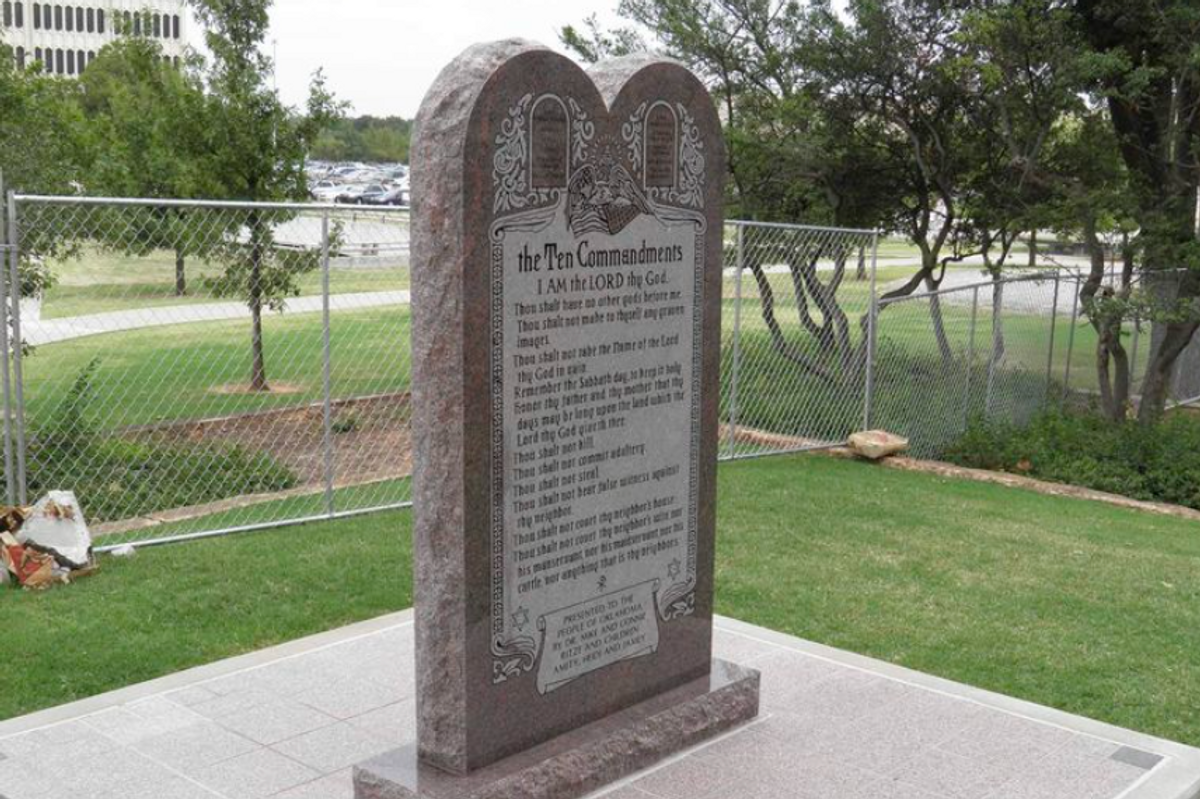
Ten Commandments monument on Oklahoma state capitol grounds
It’s precisely because of the First Amendment prohibition of an official state religion, of course, that Americans are so much more inclined to spiritualism than other technologically advanced countries. A reported 56 percent of us say we believe in the God of the Bible, as opposed to only 27 percent of Europeans.
Maybe it’s because I live in the South, where professions of skepticism are rare, but that first number seems a bit low to me. The Founding Fathers’ “wall of separation” between church and state has never had many adherents in the Confederate states, where enforced conformity strikes the majority as right and proper.
“It does me no injury for my neighbor to say there are twenty gods, or no god. It neither picks my pocket nor breaks my leg,” Thomas Jefferson wrote in his “Notes on Virginia.” Perhaps not, but it would certainly prevent the man from being elected in much of the country today. The “wall of separation” phrase is also his, causing the author of the Declaration of Independence to be reviled as an atheist even in his day.
Laws like Louisiana’s latest—a measure requiring the Ten Commandments of the Old Testament to be posted in all public-school classrooms—keep getting passed and then declared unconstitutional by federal judges mindful of the First Amendment’s plain statement forbidding a government “establishment of religion.”
A lawsuit has already been filed by the American Civil Liberties Union, Americans United for Separation of Church and State, the Freedom From Religion Foundation, and other groups representing parents with children in Louisiana schools who object to mandatory religiosity. As recently as 1980, the U.S. Supreme Court ruled that a similar Kentucky law had no secular purpose, but violated the First Amendment’s ban on state-sanctioned holiness.
Two thoughts: First, I doubt that Louisiana voters, if given the option, would ratify the U.S. Constitution as written today. Second, I suspect that the right-wing majority on the current Supreme Court could be up to the challenge of turning the First Amendment inside-out, leading to shrines and altars in public buildings nationwide.
I also frankly doubt that it would make a whole hell of a lot of difference either way. Partly, that’s because I’m old enough to remember when we had mandatory prayers in the public schools of my youth—mumbling performances serving mainly to remind us of our differences.
This at P.S. 12 in Elizabeth, New Jersey, where multi-culturism was invented, although nobody called it that. Because many of my classmates were Jews, student-led Bible readings were restricted to the Old Testament. Mainly, we stuck to the 23rd Psalm, although its metaphors—shepherds, pastures, still waters—meant little or nothing to most of us. Mostly, it was blessedly short.
Then we’d recite the Protestant version of the Lord’s Prayer, although there were few Protestants among us. When we got to the “For thine is the Kingdom…” bit at the end, we Catholics would fall ostentatiously silent. I don’t recall what the Jewish kids did. Mumbled and looked at their shoes, I imagine.
Mostly, we were just filling in the blanks. Then we’d salute the flag. More mumbling.
I wonder what they’re fixing to do in Louisiana about the rival Catholic and Protestant versions of the Ten Commandments, which differ in important particulars. I’m guessing Catholic in Lafayette, Protestant in Shreveport.
Come to think of it, my ecumenical experience as a public-school student led to the most memorable religious experience of my childhood. I believe I was eight or nine when an Irish nun giving Sunday religious instruction to us P.S. 12 heathens sent me to see Monsignor for expressing doubt that God would burn all Protestants in a fiery hell.
I said that my best friend Jeffrey was Presbyterian like his mother and father, and that I didn’t think God would be mean enough to punish him for his parents’ sins. If memory serves, Father told me that Sister may have been laying it on a bit thick about the Lord incinerating Protestants, but that I should keep my skepticism to myself lest I trouble my classmates’ faith.
I guess Monsignor was a liberal by the standard of the times. Or maybe just not Irish. I don’t recall his name, only his advice, which troubled me no end.
Anyway, it’s this kind of nonsense Louisiana’s pious Governor Jeff Landry and the GOP legislative supermajority mean to visit upon the state’s public schoolchildren. He describes it as a “drastic reform” that will “bring common sense back to our classrooms.”
Meanwhile, regardless of which version of the Ten Commandments Louisiana chooses, good luck to the state’s attorneys finding a secular purpose for “Thou shalt have no other gods before me,” and “Thou shalt not make unto thee any graven image.”
As for explaining the prohibition against adultery to second graders, that could definitely prove ticklish.
Gene Lyons is a former columnist for the Arkansas Democrat-Gazette, a winner of the National Magazine Award, and co-author of The Hunting of the President.








